 |
You are here:
Introduction
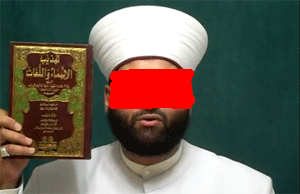 We've met this individual before somewhere, and he's running a very slick operation on the tube. We even had to commend him for his slickness, because it is very professional - when you are out to swindle, it simply has to be, there is no other choice. As most people's attention spans have dwindled to literally minutes and seeking knowledge for them has become reduced to watching byte-sized vids on the tube (because reading and studying books is so excruciatingly painful and boring), the situation is ripe for individuals such as this one to come along and play the pied-piper. Citing isolated, decontextualized statements of the Scholars or brandishing their phraseology whilst concealing the reality of what these scholars meant by it is the method by which this individual and countless others deceive and misguide the people away from the Prophetic Sunnah and instead to the misguided innovations they have entered into the religion. He is holding up the book of Imaam al-Nawawi, (تهذيب الأسماء واللغات) and is impressing upon the byte-sized deen-learner how Imam al-Nawawi, allegedly, is sanctioning the innovations (in worship) that he and his likes spread amongst the Ummah. The reality is not as simple as he makes it out to be and is in fact otherwise, and we will address this matter, by Allaah's permission in this article. We've met this individual before somewhere, and he's running a very slick operation on the tube. We even had to commend him for his slickness, because it is very professional - when you are out to swindle, it simply has to be, there is no other choice. As most people's attention spans have dwindled to literally minutes and seeking knowledge for them has become reduced to watching byte-sized vids on the tube (because reading and studying books is so excruciatingly painful and boring), the situation is ripe for individuals such as this one to come along and play the pied-piper. Citing isolated, decontextualized statements of the Scholars or brandishing their phraseology whilst concealing the reality of what these scholars meant by it is the method by which this individual and countless others deceive and misguide the people away from the Prophetic Sunnah and instead to the misguided innovations they have entered into the religion. He is holding up the book of Imaam al-Nawawi, (تهذيب الأسماء واللغات) and is impressing upon the byte-sized deen-learner how Imam al-Nawawi, allegedly, is sanctioning the innovations (in worship) that he and his likes spread amongst the Ummah. The reality is not as simple as he makes it out to be and is in fact otherwise, and we will address this matter, by Allaah's permission in this article.
Revision of the Basics
So far we have established that whenever the term "praiseworthy innovation" (البدعة المحمودة) and "good innovation" (البدعة الحسنة) is used in the language of certain scholars, they are using it purely in its linguistic sense (not Shariah sense). This we established from Ibn Hajar (see here) and also Ibn Rajab (see quote in this article). Further, we established that by inspecting and examining the actual examples given by those who categorize innovation (البدعة) into obligatory (الواجب), recommended (المندوب) and permissible (المباح), it is very clear that they are in fact speaking of either a) something that is not an innovation in the Shariah sense at all (e.g. tarawih prayer in congregation in Ramadan in the mosque) or b) something that comes under the topic of al-maslahah al-mursalah, a matter of broad public interest by which specified Shariah goals are served and by which the five necessities (religion, life, intellect, wealth and lineage) are preserved (see this article for understanding and this article for illustrative examples given by al-Izz bin Abd al-Salam to show what he actually intended). This is where schools, hospices, teaching Arabic grammar and so on enter into as explained by the Scholars who speak of innovation (bidah) having classifications. If you have got all of that in the bag, then grab your stick, join us, and lets collectively give this doubt (of the Innovators) a pounding and send it back from where it came ...
Understanding the Deceptive Tactics Of These innovators
In order to understand how these people are operating we need to know that those scholars whose words they are employing (al-Nawawi, al-Izz bin Abd al-Salam, Ibn Hajar etc.) have two types of statements:
- The first type: A mere mention of bidah being either "praiseworthy innovation" (البدعة المحمودة) or "blameworthy innovation" (البدعة المذمومة) or bidah being of categories such as obligatory (الواجب), recommended (المندوب) and permissible (المباح) but without any further elaboration and giving of illustrative examples, because within the context in which they are writing, they are only intending to make a quick hint or reference to the matter.
- The second type: A mention of those phrases and terms but this time with full elaboration and illustrative examples which reveal their intent and which show exactly what their objective is in using these terms and classifications.
Examples of each of these types will be clear as we progress in this article, but the trick and deception of the innovators is that they will gather together as many statements as they can from the first type, or selectively quote parts from the second type, and then present them to the people and subsequently make very general statements like, (هذا ما عليه كبار العلماء وهذا ما نحن عليه), "This is what the Major Scholars are upon and this is what we are upon." So your byte-sized deen learner only gets a surface-level, shallow understanding and has only learned terms and phrases yet is none the wiser about what these Scholars really intend by the use of these terms and classifications. All he knows is that the scholars used these terms and made these classifications, but any mention of them has been stripped of the explanation, meaning and illustrative exemplification. And even those quotes which may have added elaboration have been decontextualized by removal of the appropriate information which provides all the details as to what is really intended. The swindler is therefore able to lead the intended target audience into thinking that innovating into the matters of worship to bring oneself closer to Allaah is perfectly legitimate and sanctioned by these scholars, and that this is, allegedly, "what the Major scholars are upon." So the fraud is complete, having been executed to perfection with the slick presentation, and the deceiver is free to move on to the next swindle.
Practical Illustration of the Academic Fraud
The deceptive individual pictured earlier has posted a few videos and in each of them he has cited a quote from al-Nawawi from the same place in one of his books (تهذيب الأسماء واللغات). Al-Nawawi is discussing the entry (بدع) and he does actually elaborate upon it in detail, but this crooked Habashite Sufi pictured above eliminated the part where al-Nawawi explains the intent behind the classification (through a full citation from al-Izz bin Abd al-Salam). Each quote that we bring below is the subject of a separate video created by these people. Their intent is to isolate each of the general statements that offer no detail or explanation as to the intent and purpose behind the classification of these scholars so that the intended audience thinks "how numerous are these statements that legitimize innovation" when they see all these individual videos. So lets now analyze those isolated statements that are used as part of the bait.
1st Statement of Imam al-Nawawi from Tahdhib al-Asmaa wal-Lughaat
The first quote from al-Nawawi is from his book (تهذيب الأسماء واللغات), Idarah al-Tibaa'ah al-Muniriyyah, (3/22), and this is presented in its own short video on the tube:
البدعة بكسر الباء في الشرع هي إحداث ما لم يكن في عهد رسول الله وهي منقسمة إلى حسنة وقبيحة
 Al-Bidah, with a kasrah on the letter baa, in the Shariah it is the introduction (invention) of that which is not found in the era of the Messenger of Allaah, and it is divided into [that which is] good and [that which is] repugnant. Al-Bidah, with a kasrah on the letter baa, in the Shariah it is the introduction (invention) of that which is not found in the era of the Messenger of Allaah, and it is divided into [that which is] good and [that which is] repugnant.
So this quote is isolated like this and presented and a person thinks, "Hey, yes they are right, there is "good bidah" in the religion," but little does the person know what exactly al-Nawawi (and others) intend by this phrase - that part is kept hidden.
2nd Statement of Imam al-Nawawi from Tahdhib al-Asmaa wal-Lughaat
In another separate video, from the same location as above, this next passage is quoted from al-Nawawi:
قال الشيخ الإمام المجمع على إمامته وجلالته وتمكنه في أنواع العلوم وبراعته أبو محمد عبد العزيز بن عبد السلام رحمه الله ورضي عنه في آخر كتاب القواعد : البدعة منقسمة إلى واجبة ومحرمة ومندوبة ومكروهة ومباحة، والطريق في ذلك أن تعرض البدعة على قواعد الشريعة فإن دخلت في قواعد الإيجاب فهي واجبة أو في قواعد التحريم فمحرمة أو الندب فمندوبة أو في المكروه فمكروهة أو المباح فمباحة
 The Shaykh, the Imaam whose leadership, lofty stature, and proficiency and skill in a variety of sciences is agreed upon, Abu Muhammad Abd al-Aziz bin Abd al-Asalam (rahimahullaah wa radiya anhu) said, at the end of his book, al-Qawa'id: The Shaykh, the Imaam whose leadership, lofty stature, and proficiency and skill in a variety of sciences is agreed upon, Abu Muhammad Abd al-Aziz bin Abd al-Asalam (rahimahullaah wa radiya anhu) said, at the end of his book, al-Qawa'id:
Innovation is divided into obligatory (waajibah), unlawful (muharramah), recommended (makruhah), disliked (makruhah) and permitted (mubaahah), and the way to knowing that is to view the innovation in light of the Shariah principles, and so if it enters into the principles of obligation, then it is obligatory, or [if it enters into] the principles of unlawfulness, then it is unlawful, or if recommended, then recommended, or if [its falls into] the disliked, then disliked, or the permitted, then permitted.
This is the well known statement of al-Izz bin Abd al-Salaam which has been quoted from him by other authorities such as Ibn Hajar in al-Fath, and al-Shatibi also quotes it (and proceeds to refute it and show that it is itself an innovation having no proof).
3rd Statement of Imam al-Nawawi from Tahdhib al-Asmaa wal-Lughaat
Then in a separate video another section of this passage from al-Nawawi is isolated and presented, and this time it is al-Nawawi's citation of the statement of al-Shafi'i through al-Bayhaqi:
وروى البيهقي بإسناده في مناقب الشافعي عن الشافعي رضي الله عنه قال : المحدثات من الأمور ضربان، أحدهما ما أُحدث مما يخالف كتابا أو سنة أو أثرا أو اجماعا فهذه البدعة الضلالة، والثانية ما أحدث من الخير لا خلاف فيه لواحد من العلماء وهذه محدثة غير مذمومة، وقد قال عمر رضي الله عنة في قيام شهر رمضان: نعمتُ البدعة هذه، يعني أنها محدثة لم تكن
 Al-Bayhaqi reports with his chain in Manaqib al-Shafi'i from al-Shafi'i (radiallaahu anhu) that he said: Al-Bayhaqi reports with his chain in Manaqib al-Shafi'i from al-Shafi'i (radiallaahu anhu) that he said:Newly-invented matters are of two types: The first of them is what opposes [something from] the Book, or [something from] the Sunnah, or a narration [from the Companions], or [a matter of] consensus, this is the misguided innovation. And the second is what has been introduced of goodness and there is not a single scholar who opposes it. This is newly-introduced yet not blameworthy and Umar (radiallaahu anhu) had said about the qiyam (al-layl) in the month of Ramadan, "What an excellent innovation this is," meaning, that it is newly-introduced and was not previously done.
We have already addressed this quote in the article on the statements of al-Shafi'i (see here) so please refer to that. However, it is clear that al-Shafi'i's words are in relation to bidah from a purely linguistic meaning and this is very clear from what he says at the very end when he quotes the saying of Umar and then says, (يعني أنها محدثة لم تكن), "meaning, that it is newly-introduced and was not previously done..." and al-Shafi'i knows that this was in fact done by the Messenger (alayhis salam) but abandoned because he (alayhis salaam) feared it might become wajib (obligatory) upon his Ummah. So this act of worship has specific proof in the Sunnah, but its re-enactment is referred to by al-Shafi'i as "bidah" purely from a linguistic meaning and not a Shariah meaning, and this act does not have opposition to the Shariah, rather it is in perfect agreement with the Shariah, with the Prophetic Sunnah, in its foundations and details. Hence, it is not an innovation in the blameworthy sense.
All the above three quotes were all from the same section. But what was left out? Well lets go and take a look!
What Has Been Deliberately Omitted!
That's right, the most crucial part of it all, which actually explains the classifications that these Shafi'ite jurists were making use of, even thought it is right there, sandwiched between all those quotes you have read above, it is not presented and mostly kept from view. The reason is plainly obvious, because the game would be over and the fraud would be plain to see. We have already alluded to this elaboration by al-Izz bin Abd al-Salam in the articles dedicate to his statements (see Part 4 and opening of Part 5). Here is the full entry:
Al-Nawawi is citing from al-Izz, and obviously he agrees with it and his intent is the same as that of al-Izz:
 For the obligatory innovations are examples, from them: [First] Being occupied with the knowledge of grammar by which the speech of Allaah and the speech of the Messenger (sallallaahu alayhi wasallam) is understood. This [innovation] is obligatory because the preservation of the Shariah is obligatory, and its preservation cannot be maintained except by that, and that without which an obligation cannot be fulfilled is itself obligatory. Second, preservation of the [meanings of] obscure words in the language occurring in the Book and the Sunnah. Third, laying down the foundations of the religion and of jurisprudence. Fourth, speech about al-jarh wal-ta'deel (criticism and appraisal) [of narrators], and distinguishing between the authentic from the weak. The principles of the Shariah have themselves indicated that preserving the Shariah is fard kifaayah (collective obligation) regarding that which goes beyond the capacity of an individual, and that cannot be fulfilled except by what we have mentioned. For the obligatory innovations are examples, from them: [First] Being occupied with the knowledge of grammar by which the speech of Allaah and the speech of the Messenger (sallallaahu alayhi wasallam) is understood. This [innovation] is obligatory because the preservation of the Shariah is obligatory, and its preservation cannot be maintained except by that, and that without which an obligation cannot be fulfilled is itself obligatory. Second, preservation of the [meanings of] obscure words in the language occurring in the Book and the Sunnah. Third, laying down the foundations of the religion and of jurisprudence. Fourth, speech about al-jarh wal-ta'deel (criticism and appraisal) [of narrators], and distinguishing between the authentic from the weak. The principles of the Shariah have themselves indicated that preserving the Shariah is fard kifaayah (collective obligation) regarding that which goes beyond the capacity of an individual, and that cannot be fulfilled except by what we have mentioned.
And for the unlawful innovations are examples, from them: The [belief] doctrines of al-qadar, and al-jabar, and (those of) the Murji'ah and Mujassimah. Refuting these (people) is from the obligatory innovations.
For the recommended innovations are examples, from them: Setting up hospices and schools and every benevolent endeavour not present in the first era, and (also) from (the examples) is at-Tarawih, and speech regarding the details of tasawwuf, and [also] argumentation, from which is the setting up of gatherings for deduction of evidence (in knowledge based matters) [only] if Allaah, the Exalted's face is sought by that.
And for the disliked innovations are examples, from them: Adornment of the mosques, and decoration of the mushafs [of the Qur'an].
And for the permitted innovations are examples, from them: shaking hands after the morning and late afternoon prayers, and from them is taking liberties in that which is great pleasure in terms of food, drink, clothing and residence and wearing shawls and widening of the sleeves. There could be some differing regarding some of these matters and some of the Scholars may place them amongst the disliked innovations, and others may place them amongst the sunnahs that were actually performed in the time of the Messenger (sallallaahu alayhi wasallam) and also after his time, and this is like pronouncing the isti'aadhah and basmalah in the prayer.
[Al-Nawawi:] This is the end of his [al-Izz's] speech.
If you have been reading the previous parts in the series, the matter should be very clear to you. Neither al-Izz, nor al-Nawawi permitted innovations in matters of worship (in order to get closer to Allaah as is alleged) and as you can see there is nothing in what has preceded which indicates that they are laying down these classifications to enable the justification of innovating into matters of worship under the slogan of "bidah hasanah". Rather, it is clear that they are operating upon the premise that "bidah" when it is used in the Shariah is to be treated as a purely linguistic idea which needs further clarification and qualification. And that is the purpose behind them speaking of "praiseworthy innovation" or "good innovation" and into which they are including either matters of broad public interest (maslahah mursalah) (as you can see in the examples given under the "obligatory innovations") or they are matters having specific proof in the Sunnah (like the tarawih prayer in congregation in the mosque), and in which case it is not really an innovation at all (in the Shariah sense). It is useful to recall the simple diagram we used in earlier parts:
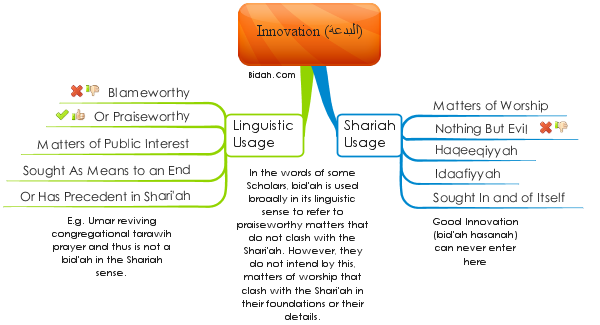
And you are very strongly recommended to refer to the more detailed diagram (click on the image below) we have in Part 7, which breaks the whole issue down more clearly and vividly, and leaves no ambiguity as to what these Shafi'ite jurists meant at all.
1st Statement of Imam al-Nawawi from Sharh Sahih Muslim
We find another video by this Habashi Sufi swindler in which he presents the statement of al-Nawawi in Sharh Sahih Muslim (Kitab al-Jumu'ah) where he comments on the saying of the Messenger (alayhis salaam), "Every innovation is misguidance" (كل بدعة ضلالة). Pay careful attention to how he quotes it (he's missed a chunk of it bang in the middle) - this is how it is in the video and how it is also transcribed:
قوله : "وكل بدعة ضلالة". هذا عام مخصوص والمراد غالب البدع قال أهل اللغة هي كل شيء عمل على غير مثال سابق. قال العلماء : البدعة خمسة أقسام : واجبة ومندوبة ومحرمة ومكروهة ومباحة.
ويؤيد ما قلناه قول عمر بن الخطاب رضي الله عنه في التراويح "نعمت البدعة" ولا يمنع من كون الحديث عاما مخصوصا قوله "كل بدعة" مؤكدا بـ "كل" بل يدخله التخصيص مع ذلك كقوله تعالى: تُدَمِّرُ كُلَّ شَىْءٍ
Now let us have a look at the full passage, we are using a 1929CE Egyptian print (al-Azhar) and it occurs in (6/154-155) in Kitab al-Jumu'ah in the chapter titled (باب خطبته صلى الله تعالى عليه وسلم في الجمعة ):
Note the parts indicated (between square red brackets) were completely omitted. Let us provide the full translation - the omitted part is in the second paragraph below:
 His (sallallaahu alayhi wasallam's) saying (كل بدعة ضلالة), "Every innovation is misguidance." This is a generalisation which has been qualified (by other texts), and the intent behind it is the majority of innovations (not all of them). The scholars of the language have said that [bidah] is: "Every thing that is performed without any prior example (precedent)." The Scholars have said bidah is five types, obligatory, recommended, unlawful, disliked and permitted. His (sallallaahu alayhi wasallam's) saying (كل بدعة ضلالة), "Every innovation is misguidance." This is a generalisation which has been qualified (by other texts), and the intent behind it is the majority of innovations (not all of them). The scholars of the language have said that [bidah] is: "Every thing that is performed without any prior example (precedent)." The Scholars have said bidah is five types, obligatory, recommended, unlawful, disliked and permitted.
So from the obligatory [innovations] is organization and composition of the evidences of the Mutakallimin for refuting the atheists and innovators and whatever resembles that. And from the recommended is authoring of the books of knowledge and building schools and hospices and other than that. And from the permitted is (taking pleasure through) indulging in the variety of foods and other than that. And as for the unlawful and disliked (types), then they are very clear. And I made this matter clear alongside its evidences in Tahdhib al-Asmaa wal-Lughaat and by knowing what I have mentioned, it becomes known that the hadeeth is [considered] to be a generalization that is qualified, and likewise (is the case with) whatever resembles it form the reported ahaadeeth.
And supporting what we have said is the saying of Umar Ibn al-Khattab (radiallaahu anhu) regarding Tarawih, "What an excellent innovation this is." And that the generalization in his saying "Every innovation" is supported by the word "Every (كل)" does not prevent from that it is subject to being qualified such as what occurs in His saying (تُدَمِّرُ كُلَّ شَيْءٍ) "Destroying every single thing (46:25)" [Meaning, even though "every (كُلَّ)" was used, not everything was actually destroyed, hence it is a generalization that is qualified with exceptions].
Note the middle paragraph in bold was conveniently ommitted just in case the audience clicks on and understands what is going on and that al-Nawawi (and al-Izz bin Abd al-Salam) certainly do not intend what todays low-life innovators, with all their dishonesty and academic treachery, intend. As for the issue of (كل), meaning "all, every" being a qualified generalization, this is discussed further below and al-hamdulillaah, this only supports us against the innovators, it is not a proof for them, it is a proof against them, it is from our goods, not theirs, they have merely stolen it and are pretending it belongs to them.
2nd Statement of Imam al-Nawawi from Sharh Sahih Muslim
This statement is generally kept hidden and is not readily presented because it reveals the actual intent of al-Nawawi (and the Shafi'ite jurists in general). Al-Nawawi is commenting upon the hadeeth (من سن في الإسلام سنة حسنة), "Whoever enacts a good Sunnah in Islaam ..." which is what today's innovators use to justify their particular interpretation of "good bidah" (which is not the same as al-Nawawi's), for they intend innovating into the matters of worship (ibaadah), whereas al-Nawawi is staunchly against that, as we shall see further below. Here is the quote, and it is absolutely crucial for you to pay attention to the part highlighted in yellow and the one underlined in red, because essentially they comprise a baseball bat and a crowbar by which we are going to metaphorically ground and pound the deception, so here is the saying of al-Nawawi (in our version, 7/104, in Kitab al-Zakah):
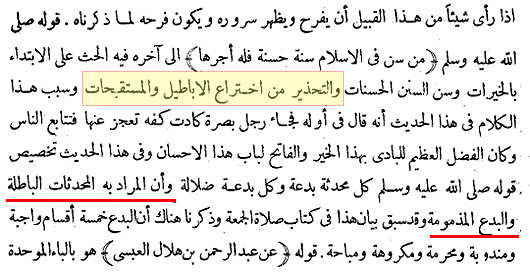
 His (sallallaahu alayhi wasallam's) saying, "Whoever enacted a good sunnah in Islam will have its reward ..." to the end of [the hadeeth]. This contains encouragement to initiate good deeds and to enact the good sunnahs and a warning from inventing falsehoods and repugnant things (mustaqbahaat). And the reason behind this statement in this hadeeth is that he (the narrator) said at the beginning of it, "Then a person came there with a money bag which his hands could scarcely lift; in fact, they could not (lift). Then the people followed continuously (in giving)..." So the great virtue was for the one who began this goodness and the one who opened the door to this benevolence. His (sallallaahu alayhi wasallam's) saying, "Whoever enacted a good sunnah in Islam will have its reward ..." to the end of [the hadeeth]. This contains encouragement to initiate good deeds and to enact the good sunnahs and a warning from inventing falsehoods and repugnant things (mustaqbahaat). And the reason behind this statement in this hadeeth is that he (the narrator) said at the beginning of it, "Then a person came there with a money bag which his hands could scarcely lift; in fact, they could not (lift). Then the people followed continuously (in giving)..." So the great virtue was for the one who began this goodness and the one who opened the door to this benevolence.
And within this hadeeth is the qualification of his (sallallaahu alayhi wasallam's) saying, "Every newly-introduced matter is an innovation, and every innovation is misguidance" and that the intent behind it is the newly introduced matters and blameworthy innovations. And the explanation of this has already preceded in Kitab al-Salat al-Jumu'ah and we mentioned there that innovations are of five types: obligatory, recommended, unlawful, disliked and permitted.
To be frank, a separate lengthy article is required to fully appreciate this passage from al-Nawawi and how it fits in with and explains the earlier passage we quoted above (from Sharh Sahih Muslim of al-Nawawi), but for now we will suffice by raising the two important issues that arise from both statements (quoted from Sharh Sahih Muslim):
The First: Concerning The Qualification of the Phrase (كل بدعة ضلالة) That It is Not Absolute and Unrestricted But Is Qualified. This is one of the favourite doubts of the innovators from the speech of al-Nawawi and what they don't realize is that this is actually a proof in our favour. It supports us, and al-Nawawi is with us in the reality of the affair. And the truth is that al-Nawawi is essentially correct because he is (as are the other Shafi'ite jurists) looking at this word (بدعة) and seeing it upon its linguistic meaning only, which incorporates all newly-invented things, blameworthy or praiseworthy, religious or otherwise. Hence, when the Messenger (alayhis salaam) says (كل بدعة), "Every innovation...", this clearly is a generalization needing qualification upon al-Nawawi's view. And we don't disagree with that, in fact it is absolutely correct to state that it needs qualification and restriction. And this is the purpose of the classification found with the Shafi'ite jurists. Conversely, the majority of the Scholars of the Sunnah, when they look at this wording (كل بدعة ضلالة), they are upon the understanding that the word (بدعة) has already been qualified in the hadeeth of Aa'ishah (مَنْ أَحْدَثَ فِي أَمْرِنَا هَذَا مَا لَيْسَ مِنْهُ فَهُوَ رَدٌ), which restricts and qualifies innovations in religion only, since the Messenger said, introduces into this affair of ours", and hence when the Messenger (alayhis salaam) says (كل بدعة), this saying is absolute, unqualified and unrestricted and applies to every innovation in the religion. So the issue here is that al-Nawawi is absolutely correct that the word (كل) is indeed a generalization that is qualified - from his particular perspective of things (which is to see the word "bidah" purely with its linguistic meaning). The difference is that most of Ahl al-Sunnah believe that that word (بدعة) is already qualified by what is in the hadeeth of Aa'ishah (radiallaahu anhaa), whereas al-Nawawi and the Shafi'ite jurists have brought a classification to enable the qualification of what they see to be a word only having its broad unqualified linguistic meaning which is "anything without any prior example whether praiseworthy or blameworthy" Now because this definition would include (in the modern era) your pizzas, burgers, hoodies, sneakers, brick and marble houses, the internet, mobile devices, types of technology and so on, these Shafi'ite jurists simply made classifications to allow these types of things to be excluded from what is otherwise the blameworthy bidah (innovation). Hence, they said there is an obligatory innovation (so we would say putting the refutations of atheists and defences of the Qura'n and the Sunnah in digital format for devices and for the internet is an obligation) and a recommended innovation (setting up online schools for teaching of Qur'an and tajweed is a recommended innovation), and a permitted innovation (enjoy that pizza, wear that hoodie and don those cool sneakers). In other words, food, drink, clothing and residence not present in that way before. So it becomes clear after all this that in reality there is no difference between these two groups of Scholars, they all have the same understanding, but are just simply using two different languages to express it. Having said this, we do consider the classification of bidah into wajib, mandub and mustahab to be an error and the truth is with the Salaf and the likes of al-Shatibi who clarified this matter.
The Second: Understanding What "Good Sunnah" is And That It is Not the "bidah hasanah" Presumed by the Innovators. The second key thing that al-Nawawi reveals to us about what his real position is known by looking at the hadeeth under discussion more fully:
Al-Mundhir bin Jarir reported on the authority of his father: While we were in the company of the Messenger of Allaah (sallAllaahu alayhi wa sallam) in the early hours of the morning, some people came there (who) were barefooted, naked, wearing striped woollen clothes, or cloaks, with their swords hung (around their necks). Most of them, in fact, all of them, belonged to the tribe of Mudar. The colour of the face of the Messenger of Allaah (sallAllaahu alayhi wa sallam) underwent a change when he saw them in poverty. He then entered (his house) and came out and commanded Bilal (to pronounce adhaan). He pronounced adhaan and iqaamah, and he (the Prophet) observed prayer (along with his Companions) and then addressed (them reciting verses of the Holy Qur'an): "O mankind, fear your Lord, Who created you from a single being" to the end of the verse, "Allaah is ever a Watcher over you" (4:1). (He then recited) a verse of Sura Hashr, "Fear Allaah and let every soul consider that which it sends forth for the morrow and fear Allaah" (59:18). (Then the audience began to vie with one another in giving charity.) Some donated a dinar, others a dirham, still others clothes, some donated a measure of wheat, some a measure of dates; till he (the Prophet) said: (Bring) even if it is half a date. Then a person from among the Ansar came there with a money bag which his hands could scarcely lift; in fact, they could not (lift). Then the people followed continuously (following the example of this man), till I saw two heaps of eatables and clothes, and I saw the face of the Messenger (sallAllaahu alayhi wa sallam) glistening, like gold (on account of joy). The Messenger of Allaah (sallAllaahu alayhi wa sallam) said: He who sets a good precedent in Islam, there is a reward for him for this (act of goodness) and reward of that also who acted according to it subsequently, without any deduction from their rewards; and he who sets in Islam an evil precedent, there is upon him the burden of that, and the burden of him also who acted upon it subsequently, without any deduction from their burden.
Note how al-Nawawi used the action of that one man (the one who came with a bag full of money) as an example of an "innovation" which - in his view - qualifies the other statement of the Messenger (كل بدعة ضلالة). This man from the Ansar was the first to bring a whole bag of money and there was no prior example for this (amongst the people and those giving), so linguistically, he did make a "good innovation." However, his practice is not really an innovation, as it is simply an enactment of an already existing Sunnah which is giving charity, however he gave in a way that others had not. He never introduced or innovated anything into the deen of Islam that which was not already from it. But the fact that al-Nawawi used this example to illustrate how the other saying of the Messenger (كل بدعة ضلالة) is qualified, only strengthens whatever we have said above, and it shows that these Scholars (Shafi'ite jurists) simply included either the re-enacted Sunnah, or the revived Sunnah or the commanded Sunnah (which we have illustrated in our detailed diagram) into their terminology of "praiseworthy innovation" - and intending that from a purely linguistic sense, because they are wrongly presuming that the use of the word (بدعة) was intended by the Messenger with its linguistic meaning only, and this is not correct, since the hadeeth of Aa'ishah (radiallaahu anhaa) is the foundation and basis of the meaning of (بدعة), innovation, in the Shariah.
Unfinished Business
As of now we have some unfinished business and if you recall from a little earlier, we said that in this last quote of al-Nawawi (in Kitab al-Zakat) there was a baseball bat and a crowbar in the form of two sentences included within that passage (highlighted in yellow and underlined in red). The time has come now to metaphorically make use of these tools that Allaah the Exalted decreed - fifty-thousand years before He created the creation - would in fact be delivered to us (Ahl al-Sunnah, the followers of the Salaf) buried in al-Nawawi's words, to be let loose upon the flimsy doubts of the Ahl al-Bid'ah.

You should be perceptive enough to understand the significance of our crowbar and baseball bat and you should pay careful attention to their wording (highlighted in yellow above)... recall from Part 6, where we looked al-Izz bin Abd al-Salam demolishing the bidah known as Salat al-Ragha'ib (an innovated prayer), and established that al-Izz does not intend by his classification of bidah into wajib, mandub and mubah what todays innovators have twisted it for. Well Imam al-Nawawi actually has two fatwas on the topic, and they are both found and documented in the book that we were quoting from in Part 6. These two fatwas are in reality what have turned those two statements above (highlighted in yellow) into the crowbar and baseball bat, and all praise is due to Allaah for this fortification and strengthening.  You should also remember what we pointed out in Part 6 about the Acid Test, which is that the only true and real way to test, verify and corroborate what these Shafi'ite jurists intend and mean by their classifications and terms is to take an example of what they consider to be a heretical innovation, look at it, examine it and then extract from that, exactly what their understanding is. Hence, we have a crowbar, a baseball bat and an acid test kit ready and waiting. So let us jump straight in, here is the first fatwa: You should also remember what we pointed out in Part 6 about the Acid Test, which is that the only true and real way to test, verify and corroborate what these Shafi'ite jurists intend and mean by their classifications and terms is to take an example of what they consider to be a heretical innovation, look at it, examine it and then extract from that, exactly what their understanding is. Hence, we have a crowbar, a baseball bat and an acid test kit ready and waiting. So let us jump straight in, here is the first fatwa:
1st Fatwa of al-Nawawi Refuting Two Bidahs in Worship (Salat al-Ragha'ib and Salat Nisf Sha'baan)
This is the first fatwa and it is found in the manuscript of Ahmad bin Yahya bin Bashara as indicated at the end of it, being copied on 13th Dhul Qa'dah, 712H.
Here is a translation of the question and answer:
 What is said by the leading scholars, the imaams of the religion (radiallaahu anhum) regarding Salat al-Ragha'ib and the Salat Nisf al-Sha'ban which are commonly practised by the people now. Did the Prophet (sallallaahu alayhi wasallam) pray them or anyone from the Companions (radiallaahu anhum ajma'een), or did any of the well-known for Imaams pray them, I mean, the Imaam Abu Hanifah, Imaam al-Shafi'i, and Malik and Ahmad bin Hanbal, or did they make any indication towards praying either of these (prayers). And is anything related about them from the Prophet (sallallaahu alayhi wasallam)? And are they in agreement with the intent (muraad) of the Shariah or not? And is it better to perform them or abandon them. And is kindling fire on these two nights above and beyond what is customary unlawful or disliked or permitted? Please answer us, rewarded in your endeavour. What is said by the leading scholars, the imaams of the religion (radiallaahu anhum) regarding Salat al-Ragha'ib and the Salat Nisf al-Sha'ban which are commonly practised by the people now. Did the Prophet (sallallaahu alayhi wasallam) pray them or anyone from the Companions (radiallaahu anhum ajma'een), or did any of the well-known for Imaams pray them, I mean, the Imaam Abu Hanifah, Imaam al-Shafi'i, and Malik and Ahmad bin Hanbal, or did they make any indication towards praying either of these (prayers). And is anything related about them from the Prophet (sallallaahu alayhi wasallam)? And are they in agreement with the intent (muraad) of the Shariah or not? And is it better to perform them or abandon them. And is kindling fire on these two nights above and beyond what is customary unlawful or disliked or permitted? Please answer us, rewarded in your endeavour.
So he (al-Nawawi) wrote in the answer:
All praise is due to Allaah. These two prayers were not prayed by the Prophet (sallallaahu alayhi wasallam) and nor anyone from the Companions (radiallaahu anhum), and nor any of the aforementioned four Imaams (rahimahullaah), and nor did any of them hint at it, and no one who is worthy of being followed has practiced it, and nothing is authentically related from the Prophet (sallallaahu alayhi wasallam) at all, and nor from anyone who is worthy of being followed. Rather, it was introduced in the later times, and praying them both is from the rejection innovations, and the futile newly-invented matters. And it is authentically related from the Prophet (sallallaahu alayhi wasallam) that he said: "Beware of the newly-invented matters, for every innovation is misguidance", and in the two Sahihs from Aa'isah (radiallaahu anhaa) who said: The Messenger of Allaah (sallallaahu alayhi wasallam) said, "Whoever introduced into this affair of ours that which is not from it will have it rejected", and in Sahih Muslim that the Messenger of Allaah (sallallaahu alayhi wasallam) said, "Whoever does an action which is not upon our affair will have it rejected."
And it is desirable for everyone to prohibit this prayer, warn from and and make [the people] flee from it, to render its performance as repugnant, reprehensible, and to spread its prohibition everywhere (amongst the people). For it is authentically related from the Prophet (sallallaahu alayhi wasallam) that he said, "Whoever amongst you sees an evil, let him change it with his hand, and if he is not able, then with his tongue, and if he is not able then with his heart."
And it is upon the Scholars to warn from it, and to turn away from it more so than it is upon others because they are taken as a model to be followed. And no one should be deceived by the fact that it is common, being practised by the common-folk, and nor by their doubts, for indeed, following (in guidance) is only done through the Messenger of Allaah (sallallaahu alayhi wasallam), not through what he himself has prohibited and warned against.
As for lighting fire and burning a lot of oil over it in the way that is done, then it is from the evils and repugnant prohibitions. And it is authentically related that the Prophet (sallallaahu alayhi wasallam) prohibited from wastage of wealth, and its meaning is to spend it upon other than the angle from which it is permitted to spend, and this action is from that, [Allaah said], "Let those beware who oppose his (the Messenger's) command that a tribulation should afflict them or a painful torment should afflict them" (24:63). May Allaah protect us from the innovated matters and protect us from falling into the oppositions, and Allaah knows best.
Allaahu Akbar! And a prostration of gratitude! These are our goods, returned to us, Ahl al-Sunnah, followers of the Salaf, the Salafis, and abject humiliation of the innovators from the Sufi grave and saint-worshippers and others besides them. Their swindle has collapsed and their spurious attachment to the statements of al-Nawawi (and other Shafi'ite jurists) laid bare. Why is Salat al-Ragha'ib and Salat Nisf Sha'ban not good bidah? Is prayer not from the Shariah? Is dhikr not from the Shariah? Don't these acts of alleged worship have a basis in the Shariah? Where are the arguments of the contemporary innovators in the face of this fatwa of al-Nawawi!
2nd Fatwa of al-Nawawi Refuting The Bidah of Salat al-Ragha'ib
This fatwa can also be found in the printed version of his fatawa in "Fatawa al-Imaam al-Nawawi" organized and arranged by his student Alaa al-Din Ibn al-Attaar, published 1411H in Egypt (on page 31). Again, pay very careful attention to the words used - and then take these choice of words of al-Nawawi and compare them to his commentary on the hadeeth (من سن في الإسلام سنة حسنة) quoted earlier - and you will see the true and real intent of al-Nawawi revealed walhamdulillaah!
Here is the translation of it:
 The Shaykh of Islam al-Nawawi was asked about the well-known Salat al-Ragha'ib performed on the first Friday night of Rajab, whether it is bid'ah or sunnah? The Shaykh of Islam al-Nawawi was asked about the well-known Salat al-Ragha'ib performed on the first Friday night of Rajab, whether it is bid'ah or sunnah?
The Answer: It is a repugnant, rejected innovation, with the most severe rejection, it comprises many evils, hence it is specifically designated to abandon it and turn away from it and to show rejection againt the one who does it. And it is upon the ruler (one in authority) - may Allaah grant him success - to prevent the people from doing it, for indeed he is a shepherd and every shepherd is responsible for his flock. The scholars have written books in rejection and rebuke of it and declaring those who perform it as fools. One should be not deceived by the abundance of those who perform it in many of the cities, and nor that it is mentioned in [the books] Qut al-Qulub, or Ihya Ulum al-Din and their likes, for it is a futile innovation. And it is authentically related from the Prophet (sallallaahu alayhi wasallam) that he said, "Whoever introduced into this affair of ours that which is not from it will have it rejected." And in the Sahih (of Muslim) that he (sallallaahu alayhi wasallam) said, "Whoever introduced into this affair of ours that which is not from it will have it rejected," and in Sahih Muslim and others that he (sallallaahu alayhi wasallam) said, "Every innovation is misguidance." And Allaah the Exalted has ordered us to return to His Book whenever there is a dispute, so He, the Exalted said, "And if you dispute regarding any matter then return it back to Allaah and His Messenger" (4:59), and He did not ordder the following of the ignoramuses, and nor being decieved by the errors of those who have erred, and Allaah knows best.
Allahu Akbar! And another prostration of gratefulness.
3rd Fatwa of al-Nawawi Refuting An innovation Related to Tarawih Prayer
This fatwa can also be found in the printed version of his fatawa in "Fatawa al-Imaam al-Nawawi" organized and arranged by his student Alaa al-Din Ibn al-Attaar, published 1411H in Egypt (on pages 25-26).
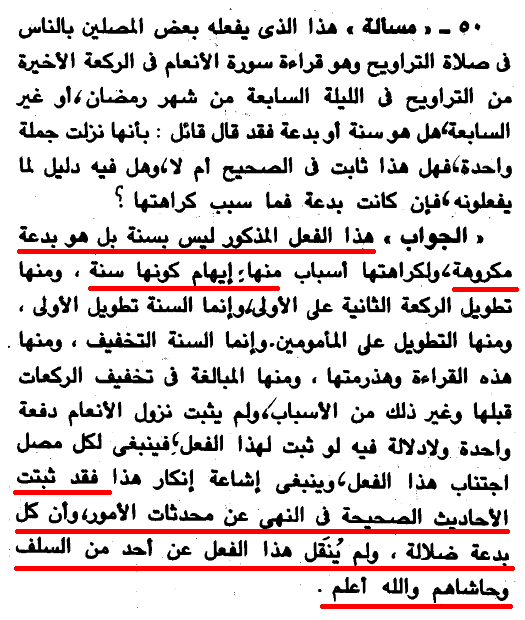
 Issue: What is done by some of those who (lead) the people (in prayer) in Salat al-Tarawih, which is the recitation of Surah al-An'aam (a lengthy Surah in earlier part of the Qur'an) in the last rakah of al-Tarawih on the seventh night in the month of Ramadan, or on other than the seventh month, is it sunnah or bidah? For someone could say that [the surah] was revealed in a single night (and thus praying with it in a single go is acceptable), so is it established in the Sahih or not? And there is any evidence therein for what they do, and if it is a bidah, what is the reason for its abhorrence? Issue: What is done by some of those who (lead) the people (in prayer) in Salat al-Tarawih, which is the recitation of Surah al-An'aam (a lengthy Surah in earlier part of the Qur'an) in the last rakah of al-Tarawih on the seventh night in the month of Ramadan, or on other than the seventh month, is it sunnah or bidah? For someone could say that [the surah] was revealed in a single night (and thus praying with it in a single go is acceptable), so is it established in the Sahih or not? And there is any evidence therein for what they do, and if it is a bidah, what is the reason for its abhorrence?
Answer: This aforementioned action is not a sunnah, rather it is a detested bidah (innovation), and its abhorrence has numerous reasons. From them: giving the impression that it is a sunnah, and form them: lengthening the second rakah over the first. The sunnah is to make it lighter (shorter), and from them: the babbling in the recitation (which is done hastily), and from them: the exaggeration in shortening the rakahs which come before it and other such reasons. It is not established that [surah] al-An'am was revealed in a single go and there is no evidence for that, and even if it was established it would not have constituted evidence for this practice. Hence, it is desirable for every one who prays (leading the people) to shun this practice, and it is desirable to spread rejection of it, for authentic hadeeths are established regarding the rejection of newly-invented matters, and that every innovation is misguidance, and this practice has not been narrated from any one of the Salaf, and far from it that it should, and Allaah knows best.
Allahu Akbar! And another prostration of gratefulness. The innovators have just received a mighty pounding in our cage. There is absolutely no doubt that when al-Nawawi says that the statement (كل بدعة ضلالة) is a generalization that has to be restricted and qualified, he means that it is qualified to remove what would otherwise enter into the purely linguistic meaning of (البدعة), such that whatever remains would only apply to blameworthy innovations (in the Shariah sense) and all other matters (like building schools, and laying down foundations of Islamic sciences, revival of what is Sunnah to begin with, and new types of foods, drink, clothing and homes) are excluded from this generalization. He is absolutely right, upon his perception of the matter, and there is nothing in this at all for the Innovators!
And as they try to flee on their heels with their dodgy merchandise we can turn swiftly to the result of our acid test.
Results of the Acid Test
As we have repeatedly stated in this series, the classifications of bidah used by certain scholars and the use of the phrases such as "praiseworthy innovation" and "bidah hasanah" were never ever intended by these scholars to justify innovations in worship. Rather, they used these terms because they thought that when the Messenger (alayhis salaam) said (كل بدعة ضلالة), he was using the word bidah from a purely linguistic meaning. Upon this understanding it is perfectly legitimate and appropriate to say that this statement must be qualified to exclude what is not otherwise blameworthy in the religion, which would include the following:
- Matters of broad public interest (maslahah mursalah) which may either be obligatory or recommended, hence, the examples given by al-Izz bin Abd al-Salam and followed by al-Nawawi, such as being concerned with Arabic grammar (obligatory) and building schools (recommended).
- Matters which are merely permitted, which include enjoyment of new forms and types of food, drink, clothing, residence.
- Matters of goodness which in and of themselves are established in the Shariah (giving charity for example), but which a person enacts from his own initiative (in a way no one did before him) and is subsequently followed by others. An example of this could be when a person takes half his savings and travels to poverty-stricken area and feeds the people and builds wells for them. So he is then followed by a dozen others. So no new act has been innovated here into Islam, but a person has simply performed an act which no one preceded him in, and it became an example for others besides him. So he instituted a "sunnah hasanah" to use the Shariah term, or if you want to use the language of others, "bidah hasanah", in other words, an innovation purely with its linguistic (not Shariah) meaning, and this is true because prior to this man, no one else took half of his own wealth and travelled to the poverty stricken place and fed the people and built wells for them.
Summary and Conclusion
 So the results of the acid test are clear, neither al-Nawawi nor al-Izz bin Abd al-Salam laid down these terms or classifications to enable the justification of innovations in the religion. The reason why they used these classifications and terms is very apparent and has been very sufficiently explained. So the results of the acid test are clear, neither al-Nawawi nor al-Izz bin Abd al-Salam laid down these terms or classifications to enable the justification of innovations in the religion. The reason why they used these classifications and terms is very apparent and has been very sufficiently explained.
The bottom line is that these scholars never set out to sanction innovation in worship and all of their speech about bidah is from the angles we have explained in this article, not from the angle of permitting departure from the Sunnah and turning to innovations, even if these innovations have a basis and support from the Shariah from some angles (like Salat al-Ragha'ib for example). We see clearly the vehemence with which al-Nawawi spoke against two innovations, Salat al-Ragha'ib and Salat Nisf Sha'ban, and it proves that these Shafi'ite jurists opposed the bidah haqiqiyyah and bidah idafiyyah (see this article) and despised innovations in worship. And if it is counter-argued that these Scholars had things which you might oppose and count as opposition to the Sunnah, then that has its own explanation in that a scholar may fall into opposition for a variety of different reasons, from them, thinking a hadeeth to be authentic when it is not, or interpreting Prophetic text(s) in a way that is incorrect, or simply being mistaken. In any case, that which constitutes proof is what is found in the Book and the Sunnah and the Ijmaa' of the Companions so whoever tried to contradict these three matters with the opinions of later scholars is in clear manifest error.
Henceforth, no one (including your Kellers, GF Haddads and slippery Habashites [all pictured]) can claim to be confused or try to use the statements of al-Nawawi after this to justify the abandonment of the Sunnah and introduction of innovations in worship and gaining nearness to Allaah (as already clarified) except that he is a stubborn, misguided, deliberate opposer of Allaah's Messenger (sallallaahu alayhi wasallam), in fact a disputant and opponent to the Messenger (alayhis salaam) who stated:
 By Him in whose hand is my soul, I have not left anything which brings you closer to Paradise and distances you from the Fire except that I have commanded you with it and have I left anything which brings you closer to the Fire and distances you from Paradise except that I have prohibited you from it. Related by Ahmad and Ibn Khuzaymah. By Him in whose hand is my soul, I have not left anything which brings you closer to Paradise and distances you from the Fire except that I have commanded you with it and have I left anything which brings you closer to the Fire and distances you from Paradise except that I have prohibited you from it. Related by Ahmad and Ibn Khuzaymah.
So we ask Allaah to either guide this person or break his back and relieve the Muslims of his harm, and what a great ocean lies between al-Nawawi (rahimahullaah) and those people who are out to rob the Muslims of their deen with such deception and lies and distorting the true and real intent of the Muslim Scholars.
Link to this article: Show:
HTML Link •
Full Link •
Short Link
Share or Bookmark this page: You will need to have an account with the selected service in order to post links or bookmark this page.







|
|
|
Related Articles:
Add a Comment
You must be registered and logged in to comment.
|
 |




|
 |

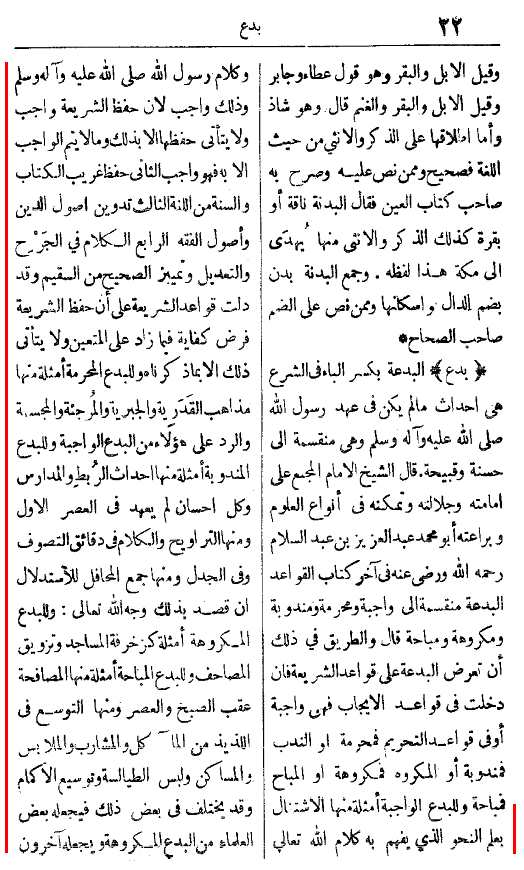
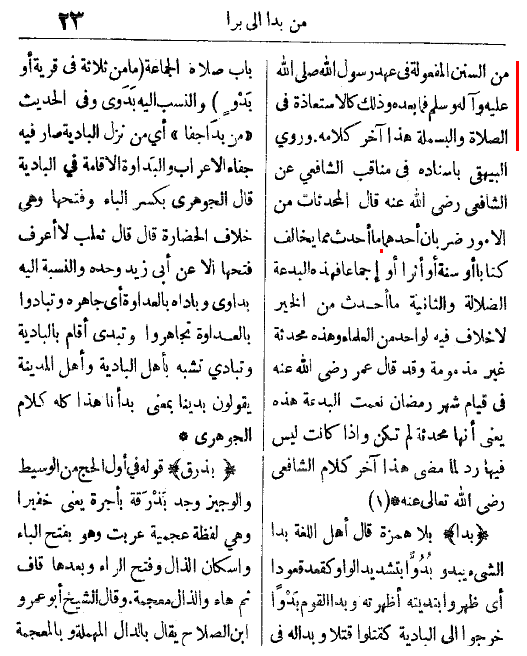

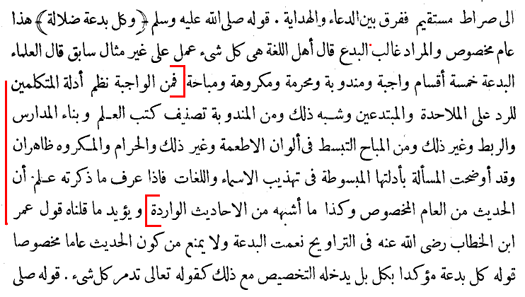


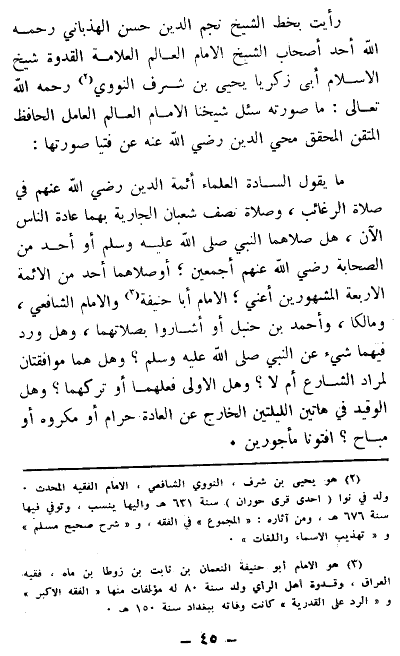
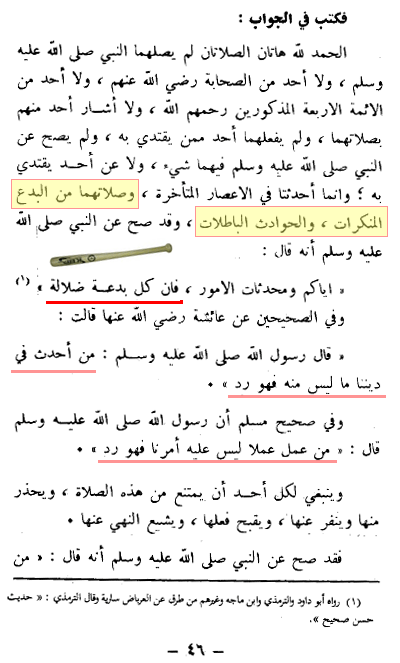
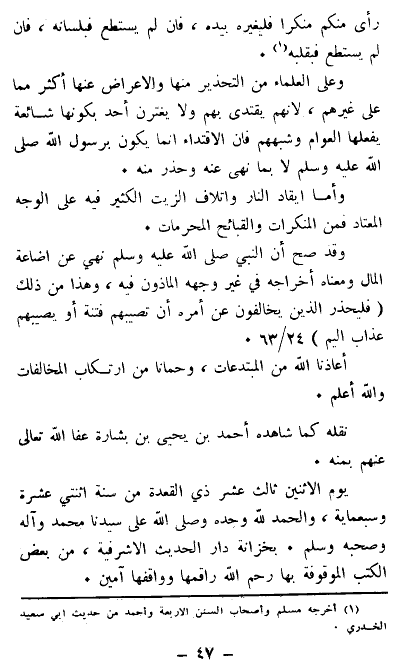
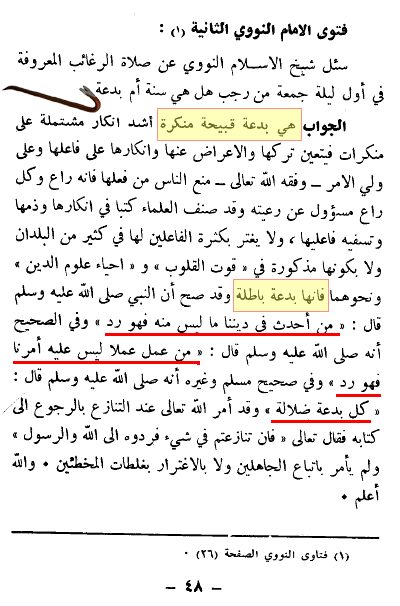



 We've met this individual
We've met this individual  Al-Bidah, with a kasrah on the letter baa, in the
Al-Bidah, with a kasrah on the letter baa, in the  Deception Alert: Note that this Habashi Sufi swindler did not complete al-Nawawi's citation from
Deception Alert: Note that this Habashi Sufi swindler did not complete al-Nawawi's citation from 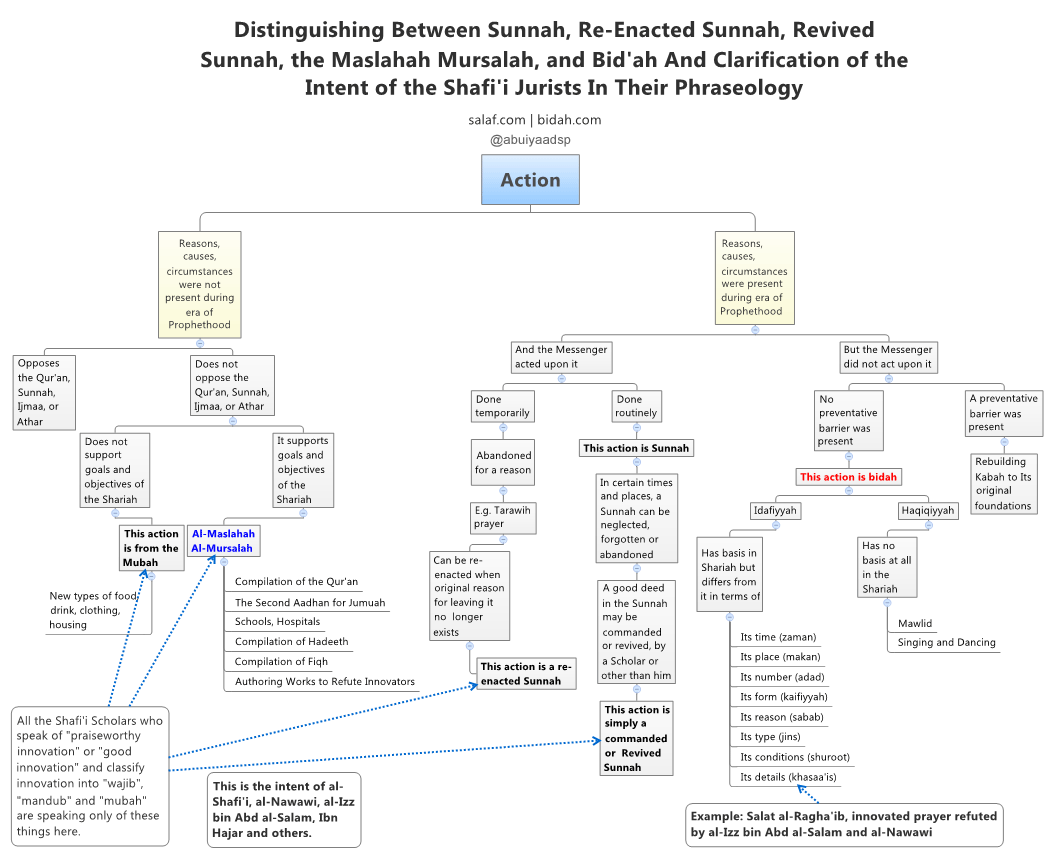
 You should also remember what we pointed out in
You should also remember what we pointed out in  So the results of the acid test are clear, neither
So the results of the acid test are clear, neither 






